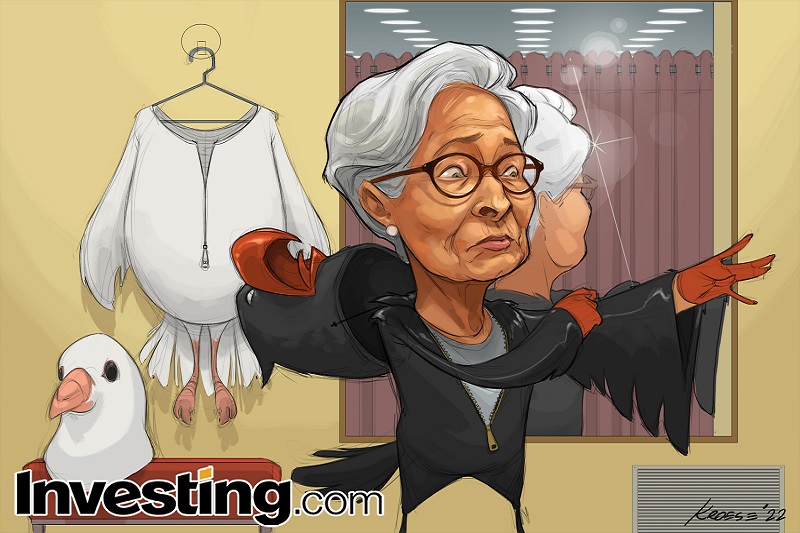By Geoffrey Smith
Investing.com -- It was inevitable really.
The realities of the post-pandemic surge in inflation worldwide finally overwhelmed the European Central Bank last week, forcing it to acknowledge – if still only implicitly - that it will have to tighten policy earlier than it thought.
Eurozone government bond yields have leaped in the wake of President Christine Lagarde’s press conference last Thursday, and short-term interest rate futures now assume that the ECB’s discount rate, which has been stuck at -0.5% since 2019 and has been below zero since 2013, will rise by some 40 basis points by the end of the year.
Eurozone bank shares, depressed for years by the ECB’s negative rates policy, have taken flight, accordingly. The Stoxx 600 Banks index is up 13% so far this year, while the shares of Deutsche Bank (DE:DBKGn) and its smaller rival Commerzbank (DE:CBKG) are up over 30% at their highest since 2018.
Seldom can markets have moved so much on the basis of what was not said, rather than what was said. Markets reacted to how Lagarde declined an invitation to repeat comments that she had made in December, namely, that an interest rate hike was “very unlikely” this year.
Instead came the rather lapidary comment that: “The situation has indeed changed.” And to make sure nobody missed the shift, Lagarde talked up the importance of the bank’s next meeting in March, when it will update its economic forecasts for the next two years.
The ECB always like to synchronize major policy shifts with its forecast updates. The ones due in March will likely show inflation staying above the bank’s medium-term target of 2% for all of this year and possibly next year too. That will give the ECB all the justification it needs to tighten monetary policy.
As with the Federal Reserve, the ECB sees it as necessary to stop its bond purchases first, before raising interest rates. The ECB has been buying around 80 billion euros a month of bonds through the pandemic. That was due to taper down to 40 billion a month from April, 30 billion from June and reach an open-ended commitment of 20 billion in September. But if, as the hawkish Dutch central bank chief Klaas Knot said at the weekend, the first hike should come in October, asset purchases will have to stop entirely by then. Small wonder that bond markets didn’t like the change in Lagarde’s tone.
For many, the surprise will be that the ECB has waited so long to join what has been an almost global trend of central banks trying to stop inflation taking root. While emerging markets and then the Federal Reserve dialed down their pandemic-era stimulus settings already over the last year, the ECB has resolutely resisted the trend, haunted by the memory of its premature rate hikes after the Great Financial Crisis a decade ago. Those mistakes triggered a devastating crisis of confidence in the viability of the euro and, for some members of the currency union, a lost decade of economic growth.
In fairness, the ECB has some strong arguments against blindly following the herd of central banks rushing to tighten. The euro area is an economy large enough to generate its own dynamics; labor shedding at the outset of the pandemic was not as dramatic in the Eurozone as it was in the U.S., so although there are pockets of tightness today and the official jobless rate is at a euro-era low of 7.0%, the Eurozone labor market is nowhere near as tight as the U.S. one. Wages have – so far – shown little sign of workers trying to claw back what they have lost to inflation.
Most importantly, most of the record 5.1% annual inflation registered over the last 12 months has been due to energy prices, over which the ECB has no power, and which can come down just as sharply as they go up.
There is, however, reason to believe that this time is different. It is not oil prices that are behind the current spike so much as natural gas prices. The standoff with Russia over Nord Stream 2 has already lasted longer than many expected, and wholesale gas and energy prices have settled into ranges well above their historical averages.
So far, the response of governments across Europe has been to announce subsidies for household fuel bills, on the assumption that this spike will pass like others before it and the subsidies – like so many before them – can be phased out in better times. That may yet be, but in the near term, the billions mobilized by the EU’s ‘Next Generation’ program, are going to be spent on fiscally unsustainable subsidies for environmentally unsustainable fuel consumption. If that isn’t enough to turn the self-consciously green ECB hawkish, it’s hard to see what will.
